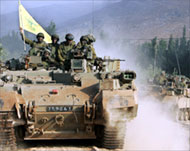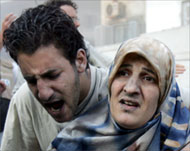Rome talks upset Arabs, please Israel
Arab countries have expressed disappointment at the Rome talks’ failure to demand a ceasefire in the Middle East, while Israel says the talks gave it “authorisation” to press its offensive in Lebanon.

Ahmed Abul Gheit, the Egyptian foreign minister, said the international conference in Rome “failed to meet Arab demands”, the official Middle East News Agency reported on Thursday as Israel continued its attacks.
Air attacks
Israeli warplanes carried out raids on suspected Hezbollah strongholds in south Lebanon and the Bekaa Valley east of Beirut on Thursday.
One policeman and two civilians died in the Bekaa, police said.
Warplanes also hit a Lebanese army base and a radio relay station, fired more than 400 missiles overnight at Khiam in the south, and destroyed several roads.
Kofi Annan, the UN secretary-general, had called for an “immediate cessation of hostilities” at the Rome talks, but Condoleezza Rice, the US secretary of state, argued that Hezbollah needed to be disarmed first.
 |
|
Israeli troops with a Hezbollah |
Abul Gheit acknowledged that despite the setback, the conference had been “a step forward in the direction of a ceasefire”.
Israel, however, saw it differently.
Haim Ramon, the Israeli justice minister, told army radio on Thursday: “We received yesterday in the Rome conference permission, in effect, from the world – part of it gritting its teeth and part of it granting its blessing – to continue the operation, this war, until Hezbollah’s presence is erased in Lebanon and it is disarmed.”
Ramon also said that “everyone who is still in south Lebanon is linked to Hezbollah, we have called on all who are there to leave. Bint Jbeil is not a civilian location, we have to treat it like a military zone”.
The minister was speaking before a security cabinet meeting on Thursday that was to decide whether to expand the offensive, now in its 16th day.
Israeli media said the cabinet wants “to step up air strikes and limit ground operations”.
Israelis growing weary
But any decision to expand the campaign might give fuel to an increasing number of Israelis criticising their government.
Nine Israeli soldiers were killed and 22 wounded in bloody battles in the south Lebanon stronghold of Bint Jbeil on Wednesday alone, and the army has been unable to stop the rocket barrages on northern Israel that have killed 18 civilians in 15 days.
After Hezbollah fighters crossed the border on July 12, killing three soldiers and capturing two others, there was strong support for the government’s decision to launch a large-scale offensive to crush the resistance group.
But that consensus is beginning to crack, and critics are starting to say the government launched the offensive hastily, with no exit strategy, and many fear the country is again entering a quagmire across its northern border.
 |
|
More than 405 people in Lebanon |
“The war is leading us by the nose to sink deeper in the Lebanese mud. The Hezbollah wants to drag us into its territory. The moment the army will be in Lebanon for an extended period, it will be hell for us in there,” said Ran Cohen, a dovish lawmaker and a colonel in the Israeli army reserves.
Ehud Olmert, the prime minister, tried to quell the criticism on Wednesday, warning of tougher times ahead and asking lawmakers to hold their tongues until the fighting ended.
But Danny Yatom, a retired general and Labour Party legislator, said the initial goals of the Israeli operation were too grandiose, and the government now realised that wiping out Hezbollah was no longer realistic.
A poll conducted before the announcement of the nine deaths on Wednesday showed that public support for pressing the offensive had begun to slip slightly, with 82% n favour, compared to 90% the previous week.
Fifty-one Israelis have been killed since July 12, including 33 soldiers and 18 civilians.
More than 405 people, many of them civilians, have been killed in Lebanon.